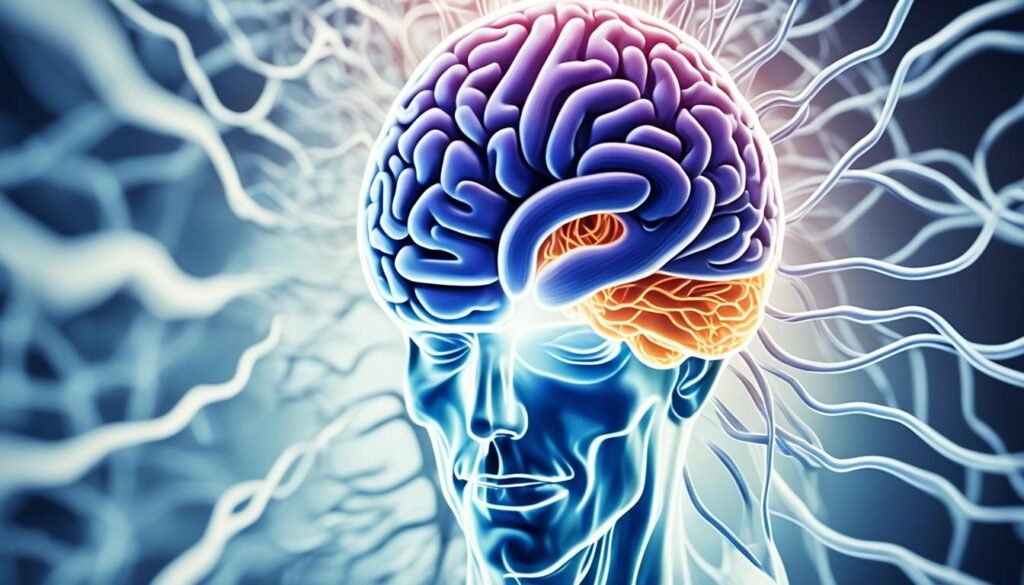Multiple sclerosis (MS) is a common disease that affects young adults. Its symptoms usually start between ages 20 to 40. In MS, the body’s immune system mistakenly attacks nerve fibers’ protective sheath. This sheath covers the brain, the optic nerves, and the spinal cord. When the sheath is damaged, scar tissue forms. This scar tissue can slow down or block how nerve signals move.
In this blog, we will explore what is multiple sclerosis, what causes it, how it shows up, how it’s diagnosed, and what treatments and lifestyle choices can help manage it.
Table of Contents
ToggleUnderstanding the Disease: What is Multiple Sclerosis?
Before anything else, let’s understand the question: what is multiple sclerosis?
Multiple Sclerosis: Definition and Disease Type
Multiple sclerosis is a long-term autoimmune condition. It mainly targets the central nervous system — this includes the brain, spinal cord, and optic nerves.
- It causes the body’s immune system to mistakenly attack the protective layer (myelin) that covers nerves.
- This damage slows or blocks messages between the brain and the rest of the body.
- MS is not the same as other neurological issues like ALS or Parkinson’s. MS often comes in waves (relapses) and affects every person differently.
So, what is multiple sclerosis in simple terms? It’s when the body fights itself and harms the nervous system.
Types of Multiple Sclerosis
Now let’s talk about the different types:
- Clinically Isolated Syndrome (CIS): A one-time episode of MS-like symptoms.
- Relapsing-Remitting MS (RRMS): The most common form. Symptoms flare up and then improve.
- Primary Progressive MS (PPMS): Steady worsening from the start, no clear relapses.
- Secondary Progressive MS (SPMS): Starts as RRMS, but later becomes progressive.
Stat Insight: About 85% of MS patients are first diagnosed with RRMS. (Source: National MS Society)
What Causes Multiple Sclerosis?
The exact causes of multiple sclerosis are still not fully known, but several factors play a role. These include problems with the immune system, genetics, and environmental triggers.
Immune System Malfunction
MS happens when your immune system faults.
- The body sees myelin (nerve coating) as a threat.
- T-cells (a type of immune cell) attack this coating.
- This leaves nerves exposed and damaged, disrupting brain-body communication.
This misfire in the immune system is the core of what is multiple sclerosis.
Genetics and Environmental Triggers
MS is not inherited directly, but there’s a link:
- If a close relative has MS, your risk is higher.
- Vitamin D deficiency is linked to increased MS risk.
- Viral infections, especially Epstein-Barr Virus (EBV), may trigger MS.
Research Note: EBV raises MS risk by 32-fold. (Source: Science, 2022)
Lifestyle and Geographical Risks
Your habits and where you live matter too:
- People who smoke have higher MS risk.
- Living far from the equator increases risk due to less sunlight (Vitamin D).
These factors explain why doctors look at many angles when figuring out what is multiple sclerosis.
Common Symptoms of MS
When MS starts, it often brings unusual and vague symptoms. That’s why knowing the early signs of MS can help.
Physical Symptoms
Physical problems often appear first:
- Muscle weakness or stiffness
- Numbness or tingling, often in arms or legs
- Problems with walking or balance
- Vision issues like blurred or double vision
These are strong hints to ask your doctor, “what is multiple sclerosis doing to my body?”
Cognitive and Emotional Symptoms
MS doesn’t just affect the body, it touches the mind too:
- Memory issues or slow thinking
- Trouble focusing or finding the right words
- Depression, mood swings, or sudden anxiety
Changes in emotions can be as disabling as physical ones.
Symptoms Over Time: Relapses and Remissions
MS is unpredictable:
- Symptoms may come and go known as relapses and remissions.
- A relapse means a new symptom or a return of old ones.
- Remission is a quiet period but MS hasn’t disappeared.
Early Symptoms
At the start, MS symptoms might be subtle or sporadic, making them easy to ignore. Common early signs include:
- Numbness or tingling in the limbs, trunk, or face
- Blurred or double vision, or temporary vision loss
- Weakness or lack of coordination in the arms or legs
- Balance and coordination difficulties, leading to clumsiness or falls
- Fatigue, both physical and cognitive
- Cognitive changes, such as problems with memory, attention, or processing speed
- Bladder or bowel dysfunction
Later Symptoms
As MS progresses, symptoms can worsen and become more disabling. Later symptoms might include:
- Severe muscle spasms or paralysis
- Chronic pain, such as trigeminal neuralgia or neuropathic pain
- Difficulty with speech, swallowing, or maintaining proper posture
- Impaired vision, including complete blindness in one eye or both
- Significant cognitive decline, affecting memory, problem-solving, and daily living
- Respiratory problems and difficulty breathing
Associated Conditions
People with MS may also face certain secondary conditions. These include:
- Urinary tract infections
- Pressure sores or bedsores
- Muscle imbalances and poor posture
- Decreased bone density and risk of fractures
- Depression, anxiety, and other mental health concerns
Remember, MS symptoms can differ greatly from one individual to the next. The disease’s trajectory can be hard to predict. It’s vital to stay in touch with your healthcare provider for symptom management and updates.
Timeline Chart: MS Symptom Progression
| Stage | Symptoms | Duration |
|---|---|---|
| Early (CIS) | Vision changes, tingling, fatigue | Days to weeks |
| RRMS | Flare-ups, followed by improvement | Months to years |
| Progressive MS | Gradual worsening | Ongoing |

How is Multiple Sclerosis Diagnosed?
Wondering how doctors confirm what is multiple sclerosis? It’s a detailed process involving your medical story and several tests.
Diagnosing multiple sclerosis (MS) is hard because no single test can do it. Doctors rely on various methods to reach a diagnosis. These include:
- They start by talking to you about your symptoms and any recent changes. Then, they do a detailed check of your body’s nerve functions.
- Multiple sclerosis testing often involves MRI scans. These show scarring or lesions in your brain and spinal cord.
- They might also perform a lumbar puncture. This is when they take a sample of fluid from your spine for further study.
- Doctors do blood tests, too. These tests help rule out other conditions that might look like MS.
Confirmation of MS usually comes after observing at least 2 distinct attacks. These might show up on an MRI, even if you didn’t notice them.
Your MS type is classified by your symptoms and MRI results. These show when nervous system damage occurred.
For progressive MS, diagnosis takes longer. This type worsens slowly and its symptoms vary widely. This makes pinpointing the disease tougher.
Insight: Brain MRI finds MS in 95% of first-time patients.

Can Multiple Sclerosis Be Treated or Cured?
There is no permanent cure yet, but there are many MS treatment options that improve life quality and slow progression.
Disease-Modifying Therapies (DMTs)
These are drugs that change the course of MS:
- Available as pills, injections, or infusions
- Reduce relapse frequency and slow down nerve damage
- Best results when started early after diagnosis
Symptom Management
Even with DMTs, symptoms can persist. Supportive care helps:
- Physical therapy to improve movement
- Occupational therapy to handle daily tasks
- Cognitive rehab to strengthen thinking and memory
All these tools help answer: “what is multiple sclerosis doing and how do I fight back?”
Holistic and Alternative Approaches
Lifestyle plays a big role in MS care:
- Anti-inflammatory diet (e.g., Mediterranean diet)
- Yoga and stretching
- Supplements, especially Vitamin D
- Stress management practices like deep breathing
Top 5 MS Medications and Side Effects
| Medication | Form | Effectiveness | Common Side Effects |
| Interferon Beta | Injection | Moderate | Flu-like symptoms |
| Fingolimod | Oral | High | Headache, liver issues |
| Natalizumab | Infusion | Very High | Infection risk |
| Glatiramer Acetate | Injection | Moderate | Injection site pain |
| Ocrelizumab | Infusion | High | Respiratory infections |
Living with Multiple Sclerosis
Living with multiple sclerosis (MS) can be tough, both physically and emotionally. But, with the right support, people can still enjoy life. Getting a care checkup yearly and focusing on your physical health and mental well-being are key.
Managing Physical Challenges
It’s important to keep up with your healthcare team to manage MS symptoms. Exercise is great for people with MS. It fights tiredness and makes you stronger. And, don’t forget to get a flu shot every year to stay healthy.
Changing your home and getting financial help can make daily life easier. Make sure your home has what you need. And use financial support like Statutory Sick Pay to improve your life.
Mental Health and Support
MS can really affect mental health. It puts stress on you and your loved ones. Talking to therapists or joining support groups can really help.
Staying social, enjoying hobbies, and taking time for yourself are important. By caring for your body and mind, you can live a full life with MS.
Research and Advancements
Scientists are getting closer to understanding multiple sclerosis (MS). They are also finding better ways to treat it. Research on multiple sclerosis looks into why certain proteins in memory T cells don’t work right and the roles genes play.
Basile et al.’s study showed that Tetraspanin 32 doesn’t function well in MS patients’ memory T cells. This hints at how this protein might affect the disease. Anagnostouli et al. discovered certain gene types that make someone more likely to get MS or protect them from it. This was found in a group from Hellenic.
New ways to diagnose and treat MS are also on the rise. Gudowska-Sawczuk et al. developed a method using Kappa Free Light Chains and IgG. This method might make it easier to find MS early and manage it better.
Researchers are also looking into how MS affects thinking and memory. Pitteri et al. found that even patients who seemed to think fine at first actually had lower memory and thinking skills. This shows the importance of checking all MS patients’ mental abilities and giving them any help they need.
Now, scientists are focusing on some new treatment paths. One interesting area is antigen-specific immunotherapy for MS. Kammona and Kiparissides’ work discusses recent progress in this area. Meanwhile, Metaxakis et al. look into molecular treatments for MS.

As we learn more, different research areas in MS are growing. Researchers are digging into genetics, new ways to find MS, and creative treatments. These steps forward in MS research offer hope for those with the condition.

MS Prognosis: What the Future Holds
Let’s now look ahead. What can one expect long-term when diagnosed with MS?
Disease Outlook Over Decades
MS moves at different speeds:
- Some people have mild symptoms for years
- Others need walking aids within 15–20 years
- Progression is slower with early treatment
Life Expectancy and Quality of Life
MS isn’t a death sentence:
- With treatment, most people live close to normal lives
- Life expectancy with MS is only 7 years shorter than average
- Mental and emotional health play a big role in wellbeing
Emerging Research & Hope for a Cure
Science keeps pushing forward:
- Stem cell trials show promise in halting MS
- Research on remyelination (nerve repair) is growing
- AI tools now track MS progression with accuracy
MS Research Timeline
| Year | Discovery |
| 1993 | First DMT approved |
| 2017 | Stem cell therapy begins trials |
| 2022 | AI used in MRI for early MS detection |
A Doctor’s Perspective: Message from Dr. Chandril Chugh
If you’re still wondering what is multiple sclerosis, know this, you are not alone, and there are answers. The journey with MS can feel uncertain, but the right medical support can make a world of difference. My team and I are here to guide you with the most up-to-date care, honest advice, and compassion.
If you or a loved one is facing MS or its symptoms, don’t wait. Reach out and schedule a consultation today.
FAQ
What is multiple sclerosis?
Multiple sclerosis (MS) is a chronic, autoimmune disease. It affects the central nervous system. Here, the immune system attacks the nerve fibers’ protective myelin. This leads to scar tissue formation.
Scar tissue can slow or stop nerve signal transmission. As a result, a wide range of symptoms show up.
What are the common symptoms of multiple sclerosis?
MS symptoms vary based on the lesion locations and severity in the central nervous system. Early signs might include fatigue, vision issues, and numbness. Weakness, balance problems, and cognitive issues could also appear.
How is multiple sclerosis diagnosed?
Diagnosing MS can be hard because no single test confirms it. Doctors look at medical history and do a physical exam. Neurological tests and an MRI help as well. Other tests might be needed for a final diagnosis.
What are the treatment options for multiple sclerosis?
Unfortunately, there’s no cure for MS yet. But, there are treatments to help manage it. Options include meds for prevention and symptom control. Corticosteroids and plasmapheresis are used too.
The treatment goal is to slow down the disease. It also aims to make relapses less severe and manage symptoms effectively.
How can someone living with multiple sclerosis manage the condition?
Managing MS involves physical and emotional challenges. With the right support, people can still live fulfilling lives. This includes managing physical symptoms and taking care of mental health. Seeking support from healthcare providers and loved ones is crucial.
What are the latest advancements in multiple sclerosis research?
There have been great strides in MS research. Researchers are learning more about the disease’s mechanisms. They are developing better drug therapies. Another big focus is the gut microbiome’s role. Understanding genetics, immunity, and environmental links is also a priority.
Source Links
- https://www.mayoclinic.org/diseases-conditions/multiple-sclerosis/symptoms-causes/syc-20350269
- https://www.hopkinsmedicine.org/health/conditions-and-diseases/multiple-sclerosis-ms
- https://www.nhs.uk/conditions/multiple-sclerosis/
- https://www.ninds.nih.gov/health-information/disorders/multiple-sclerosis
- https://www.nhs.uk/conditions/multiple-sclerosis/causes/
- https://www.mayoclinic.org/diseases-conditions/multiple-sclerosis/diagnosis-treatment/drc-20350274
- https://www.nhs.uk/conditions/multiple-sclerosis/diagnosis/
- https://www.nhs.uk/conditions/multiple-sclerosis/treatment/
- https://www.nhs.uk/conditions/multiple-sclerosis/living-with/
- https://www.ncbi.nlm.nih.gov/pmc/articles/PMC7692630/
- https://www.nhs.uk/conditions/multiple-sclerosis/symptoms/
- https://www.ncbi.nlm.nih.gov/pmc/articles/PMC5241505/
- https://emedicine.medscape.com/article/1146199-overview
About The Author

Medically reviewed by Dr. Chandril Chugh, MD, DM (Neurology)
Board-Certified Neurologist
Dr. Chandril Chugh is a U.S.-trained, board-certified neurologist with expertise in diagnosing and managing neurological disorders, including migraines, epilepsy, Parkinson’s disease, and movement disorders. His clinical focus includes evidence-based neurological care and patient education.
All content is reviewed for medical accuracy and aligned with current neurological guidelines.




